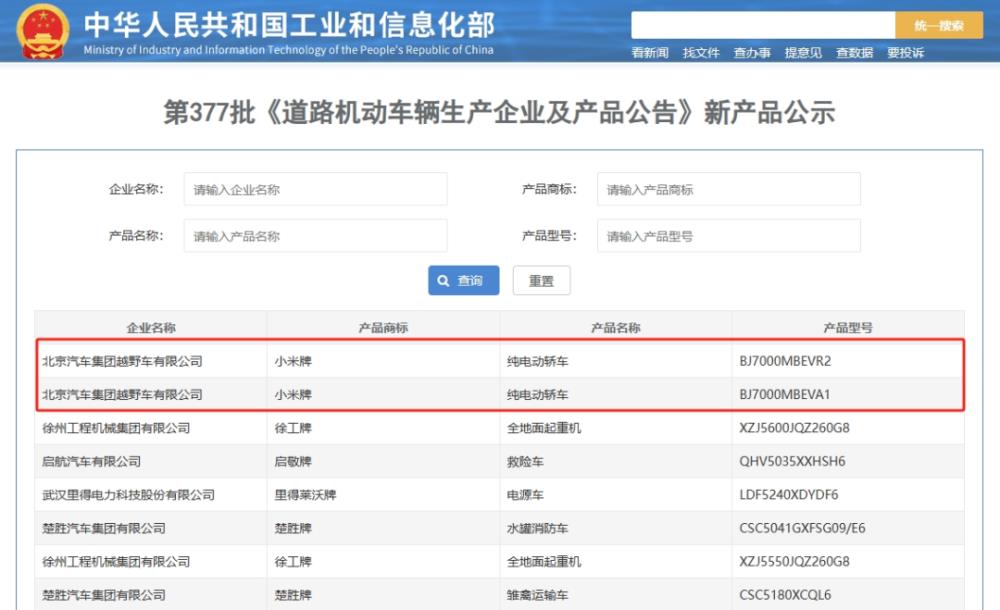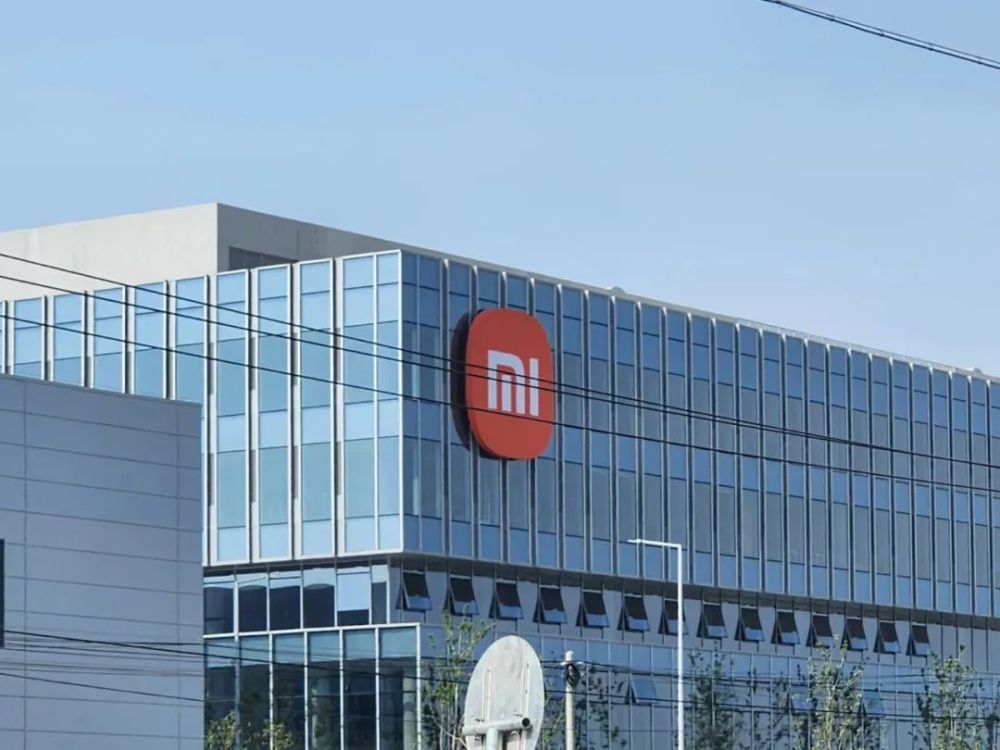Xiaomi automobile is finally announced! Lei Jun is under even greater pressure.

Finally, Xiaomi Automobile ushered in the publicity.
On November 15th, the Ministry of Industry and Information Technology announced the contents of the Announcement of Road Motor Vehicle Manufacturers and Products (the 377th batch) and the Catalogue of Energy-saving and New Energy-using Vehicles with Vehicle and Vessel Tax Relief (the 56th batch), and two Xiaomi brand pure electric cars were listed.
It is different from the expected approval of the Beijing Development and Reform Commission’s pure electric passenger car project, and then applying for relevant licenses from the Ministry of Industry and Information Technology as Xiaomi Automobile. The applicant for Xiaomi Automobile’s two products is Beijing Automobile Group Off-road Vehicle Co., Ltd., which is simply understood as using the production qualification of Beiqi off-road, and the actual production will still be the Xiaomi factory located in Yizhuang, Beijing.
In any case, Xiaomi Automobile has made key progress since it was officially listed, which does not make Lei Jun feel a little relaxed. On the contrary, since the product was publicized, Lei Jun’s pressure may be even greater.
01
Will there be independent production qualification?

At the end of August this year, Reuters quoted people familiar with the matter as saying that Xiaomi had been approved by the National Development and Reform Commission to produce electric vehicles, but it still needed the approval of the Ministry of Industry and Information Technology. But so far, there has been no official confirmation about the production qualification.
Previously, in order to let a few catfish in, from March 16, 2016 to January 8, 2019, in less than three years, there were Beiqi New Energy, Changjiang Automobile, Future Automobile, Chery New Energy, Min ‘an Automobile, Wanxiang Group, Jiangling New Energy, Chongqing Jin Kang New Energy, Guoneng New Energy, Yundu New Energy, Zhidou, Henan Suda, Zhejiang Hezhong, Land Ark, etc.
On January 10, 2019, the Regulations on Investment Management of Automobile Industry (hereinafter referred to as the Regulations) was officially implemented, and the whole automobile and other investment projects were put on record by the local development and reform departments. Among them, the whole vehicle investment project is filed by the provincial development and reform department. However, in more than four years after the formal implementation of the filing management, no enterprise has received the approval of the passenger car project. According to the anecdotal view, this is related to the unsatisfactory development of most of the 18 approved enterprises and the overcapacity of new energy vehicles.
According to incomplete statistics, neither the car-making projects under the Internet companies such as Baidu and Didi, nor the new wave of new car-making forces such as Niu Chuang and Luo Wei, have obtained the car-making qualification, even the way to "acquire" the qualification is basically blocked.
Until the appearance of Xiaomi Automobile, it was thought that it was expected to break the silence of the qualification examination and approval for making cars for more than four years. Now, obtaining the production license by borrowing chickens and laying eggs first means whether Xiaomi Automobile can obtain the "independent production qualification" later. There are great variables.
Well done, maybe, but not well done, it may drift away.
02
Beijing has high hopes for Xiaomi Automobile.
In fact, the smooth progress of Xiaomi Automobile cannot be separated from the strong support of Beijing. Once upon a time, the output value of new energy vehicles in Beijing was in a leading position in China, but in recent years, Xi ‘an, Shanghai, Liuzhou, Chongqing and Guangzhou have developed rapidly. According to the production and sales data in 2022, the output of Xi ‘an, Shanghai, Chongqing and Guangzhou are in the forefront.
The automobile industry is one of the pillar industries in Beijing’s manufacturing industry, and naturally it will not be content with others. At present, Beijing is making great efforts to promote the transformation, upgrading and development of the automobile industry, clearly focusing on intelligence, green and coordination, and taking intelligent networked vehicles as one of the key and strong "Beijing Zhizhi" industries. In this context, in addition to the existing vehicle companies, Beijing also needs new forces to build cars to speed up the conversion of old and new kinetic energy. LI and Xiaomi are key support projects.
At the beginning of 2022, Xiaomi Automobile and LI, as two new car companies, were written into the 2022 Beijing Municipal Government Work Report, which clearly stated that Xiaomi Automobile should be promoted to start construction and LI should be built.
Lei Jun is also mindful of Beijing’s support. During the two sessions of the National People’s Congress this year, Lei Jun, a representative of the National People’s Congress, solemnly stated at the plenary session of the Beijing delegation: "Xiaomi is a Beijing-born enterprise, which must take root in Beijing’s development and make due contributions to the scientific and technological innovation and economic development of the capital. Here I express my determination that I will definitely build the car and will never live up to everyone’s expectations. "
In March this year, the list of "Three 100" key projects in Beijing in 2023 was released, and the second phase of Xiaomi Smart Factory, the technical renovation project of Beijing Benz automobile, the global flagship factory in LI and many other high-profile projects were all on the list.
In July this year, Yin Yong, deputy secretary of Beijing Municipal Committee and mayor, expressed the hope that the majority of private scientific and technological enterprises would actively integrate into the construction of Beijing International Science and Technology Innovation Center, continue to increase investment in R&D, tackle key core technologies and form more international leading scientific and technological achievements. Adhere to the main business, strengthen the industry, combine the capital’s functional positioning and demand layout of high-tech projects, continue to exert efforts in frontier fields such as intelligent manufacturing, cloud computing, artificial intelligence, intelligent networked cars and robots, and play a greater role in promoting high-quality development in Beijing.
Beijing’s support and expectation, and Lei Jun’s statement of "never fail" do not allow the Xiaomi automobile project to go wrong, which invisibly adds a lot of pressure to Lei Jun..
0three
New challenges will follow.
Since Lei Jun announced that Xiaomi built a car, the news about Xiaomi has always attracted great attention from the outside world, especially how to obtain production qualifications and whether it can be mass-produced as planned.
Based on the known news at present, Xiaomi Automobile has entered the stage of small-batch trial production, further verifying the reliability of the products, and ensuring that the products produced in small batches for three months have no major problems, and officially started mass production.
Xiaomi Automobile Factory had previously urgently recruited five major types of operations, with a gap of 100 people at one time. These jobs include painting operators, battery shop operators, assembly operators, body operators and equipment maintenance workers. Previously, a reporter from China Automotive News also visited Xiaomi Factory. After lunch break, I saw a large number of production workers entering the factory to start work. At that time, some workers said that the manufacturing work of Xiaomi automobile had already started, and vehicles were off the assembly line every day.
It is not difficult to find that Xiaomi Automobile has been rushing to ensure mass production on schedule. However, mass production is only the first step to build a car. The construction of sales channels, capacity climbing, supply chain system construction, etc. are all challenges that Xiaomi Automobile will face in the future. These challenges are no easier than applying for qualification and mass production.
At the graduation ceremony of Wuhan University this year, Lei Jun once said with emotion: "At the age of 51, I decided to start a business for the last time in my life and be a car! From software to e-commerce, to mobile phones, to cars, the unprecedented span is even more difficult. "
Obviously, Lei Jun, who is over half a hundred years old, is also under great pressure. After all, when Xiaomi made a mobile phone in 2010, smart phones just started to rise, and Xiaomi’s mobile phone got the dividend of the times, but the time node for mass production of Xiaomi’s first car is somewhat late.
At present, the track of smart electric vehicles is already very crowded, and new and old car-making forces have laid out cutting-edge products in various segments. Xiaomi automobile no longer has any first-Mover advantage, and it is hard to say how much differentiated competitiveness the first production model has.
According to previous news, Xiaomi Automobile is making real-time product strategy adjustment, and has added an extended program in addition to the pure electric technology route. The extended program version is expected to be listed in 2025 with the second generation platform. In addition, Xiaomi’s newly released new operating system Xiaomi 澎湃 OS may also be installed on Xiaomi car.
According to the information published by the Ministry of Industry and Information Technology, the models of the two Xiaomi brand cars are SU7 and SU7 Max/Pro respectively. In terms of size, the length, width and height are 4997mm, 1963mm and 1455mm respectively, and the wheelbase is 3000mm, so they are positioned as C-class cars. However, this market segment is not only one of the few territories where joint-venture fuel vehicles still dominate, but also a highland that many new car-making forces desperately seize.
According to informed sources, Xiaomi Automobile will start mass production in December and go on sale in February next year. According to this progress, Xiaomi Automobile will be officially launched soon. The results are about to be announced. It is not easy for Xiaomi to win the first battle, and the only thing Lei Jun can do is to continue to go all out.